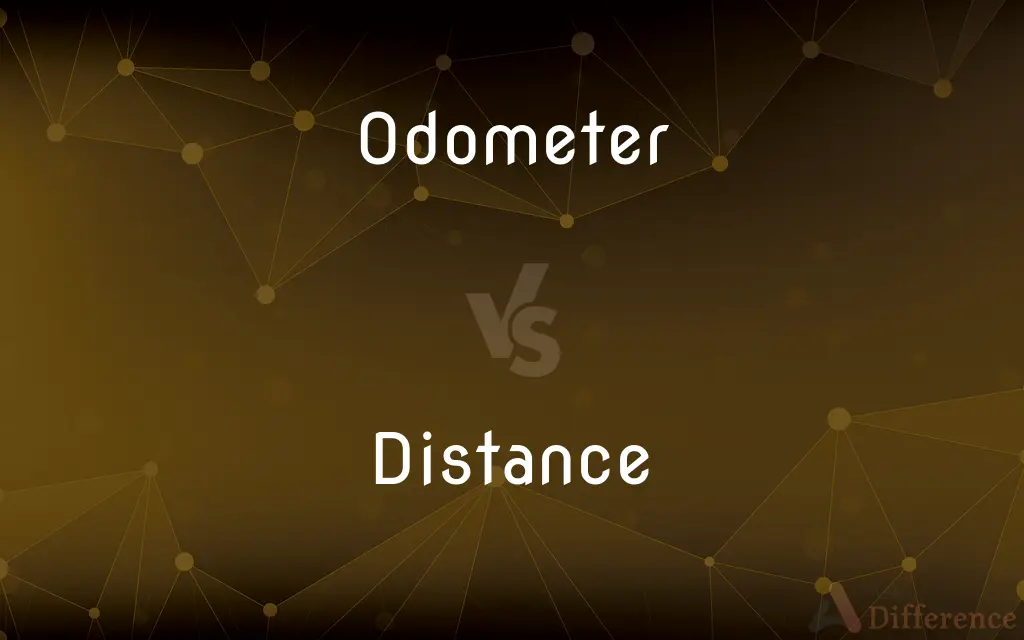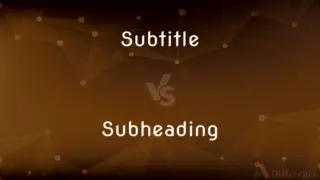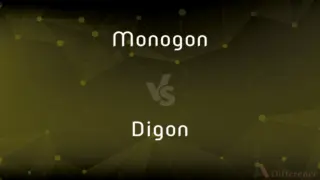Odometer vs. Distance — What's the Difference?
By Tayyaba Rehman & Urooj Arif — Updated on March 29, 2024
An odometer measures the total distance a vehicle has traveled, while distance refers to the length of space between two points.

Difference Between Odometer and Distance
Table of Contents
ADVERTISEMENT
Key Differences
An odometer is a device found in vehicles that records the total distance they have traveled. This device is essential for maintenance schedules, resale value, and legal documentation. On the other hand, distance measures the length of space between two points, which can be calculated in various units such as miles or kilometers, and is a fundamental concept in physics, navigation, and everyday life.
While an odometer provides a cumulative account of distance covered over the lifetime of a vehicle, the concept of distance is more versatile, applicable to any two points in space or on a map. Distance can be used to plan routes, estimate travel times, and measure the separation between locations, whereas an odometer's readings are specific to the journey of a single vehicle.
Odometers can be mechanical or digital, with digital versions offering more features such as trip distances and system diagnostics. Distance measurement, however, relies on mathematical calculations or physical measurement tools like rulers, measuring tapes, or advanced technology such as GPS for accurate determination between two locations.
In terms of functionality, the odometer serves a specific purpose within the context of vehicle usage, tracking not just distance but indirectly influencing vehicle maintenance, fuel economy assessments, and warranty conditions. Conversely, the concept of distance encompasses a broader scope, essential in various fields like astronomy, where it scales up to measure vast cosmic separations, or in sports, where it quantifies athletic performance.
Understanding the difference between an odometer reading and the concept of distance is crucial for practical applications such as navigation, logistics, and spatial analysis. While the odometer tells you how far a vehicle has gone, knowing the distance between your current location and your destination can help you plan the most efficient route, estimate arrival times, and manage resources like fuel.
ADVERTISEMENT
Comparison Chart
Definition
A device measuring the total distance a vehicle has traveled
The length of space between two points
Context
Vehicle-specific
Universal, applicable in various contexts
Measurement Units
Miles or kilometers
Miles, kilometers, meters, feet, etc.
Functionality
Cumulative distance tracking for vehicles
Measurement of space between locations
Applications
Vehicle maintenance, resale value
Navigation, planning, spatial analysis
Compare with Definitions
Odometer
A device for measuring the distance traveled by a vehicle.
The car's odometer shows 50,000 miles, indicating its usage.
Distance
Can be physical or conceptual.
The distance between two ideas can symbolize their conceptual difference.
Odometer
Can be mechanical or digital.
Modern cars feature digital odometers for enhanced accuracy.
Distance
Measured in various units.
Marathon runners cover a distance of 42.195 kilometers.
Odometer
Often integrated into a vehicle's dashboard.
The odometer and speedometer are essential for driving.
Distance
Reflects separation or interval.
Social distancing requires keeping a safe distance from others.
Odometer
Records cumulative distance.
The odometer reading is crucial for maintenance schedules.
Distance
Essential in navigation and mapping.
GPS devices calculate distance to provide driving directions.
Odometer
Helps in assessing vehicle wear and tear.
A low odometer reading usually suggests a less used vehicle.
Distance
Measure of the length of space between two points.
The distance from New York to Los Angeles is about 2,800 miles.
Odometer
An odometer or odograph is an instrument used for measuring the distance traveled by a vehicle, such as a bicycle or car. The device may be electronic, mechanical, or a combination of the two (electromechanical).
Distance
Go far ahead of;
He outdistanced the other runners
Odometer
An instrument for measuring the distance travelled by a wheeled vehicle.
Distance
Distance is a numerical measurement of how far apart objects or points are. In physics or everyday usage, distance may refer to a physical length or an estimation based on other criteria (e.g.
Odometer
An instrument that indicates distance traveled by a vehicle.
Distance
The length of the space between two points
You may have to walk long distances
I cycled the short distance home
Odometer
An instrument, usually embedded within the speedometer of a vehicle, that measures the distance the vehicle has traveled since production.
Distance
The full length of a race
He claimed the 100 m title in only his second race over the distance
Odometer
A wheel used by surveyors, which registers distance traveled.
Distance
The avoidance of familiarity; reserve
A mix of warmth and distance makes a good neighbour
Odometer
An instrument attached to a vehicle or connected, as by a flexible cable, to the wheel of a vehicle, which measures the distance traversed.
Distance
Make (someone or something) far off or remote in position or nature
Her mother wished to distance her from the rough village children
Odometer
A hodometer.
Distance
Beat (a horse) by a distance.
Odometer
A meter that shows mileage traversed
Distance
The extent of space between two objects or places; an intervening space.
Distance
The fact or condition of being apart in space; remoteness.
Distance
(Mathematics) The length or numerical value of a straight line or curve.
Distance
The extent of space between points on a measured course.
Distance
The length of a race, especially of a horserace.
Distance
A point or area that is far away
"Telephone poles stretched way into a distance I couldn't quite see" (Leigh Allison Wilson).
Distance
A depiction of a such a point or area.
Distance
A stretch of space without designation of limit; an expanse
A land of few hills and great distances.
Distance
The extent of time between two events; an intervening period.
Distance
A point removed in time
At a distance of 11 years, his memory of the crime was blurry.
Distance
The full period or length of a contest or game
The challenger had never attempted the distance of 12 rounds.
Distance
An amount of progress
The curriculum committee is a distance from where it was last month.
Distance
Difference or disagreement
The candidates could not be at a greater distance on this issue.
Distance
Emotional separateness or reserve; aloofness.
Distance
To place or keep at or as if at a distance
"monks who had distanced themselves from the official ecclesiastical hierarchy by resurrecting the ascetic traditions of the early Church Fathers" (Rosamund Bartlett).
Distance
To cause to appear at a distance.
Distance
To leave far behind; outrun.
Distance
(countable) The amount of space between two points, usually geographical points, usually (but not necessarily) measured along a straight line.
The distance to Petersborough is thirty miles.
From Moscow, the distance is relatively short to Saint Petersburg, relatively long to Novosibirsk, but even greater to Vladivostok.
Distance
Length or interval of time.
Distance
The difference; the subjective measure between two quantities.
We're narrowing the distance between the two versions of the bill.
The distance between the lowest and next gear on my bicycle is annoying.
Distance
Remoteness of place; a remote place.
Distance
Remoteness in succession or relation.
The distance between a descendant and his ancestor
Distance
A space marked out in the last part of a racecourse.
Distance
The entire amount of progress to an objective.
He had promised to perform this task, but did not go the distance.
Distance
A withholding of intimacy; alienation; variance.
The friendship did not survive the row: they kept each other at a distance.
Distance
The remoteness or reserve which respect requires; hence, respect; ceremoniousness.
Distance
The space measured back from the winning-post which a racehorse running in a heat must reach when the winner has covered the whole course, in order to run in the final heat.
Distance
(transitive) To move away (from) someone or something.
He distanced himself from the comments made by some of his colleagues.
Distance
(transitive) To leave at a distance; to outpace, leave behind.
Distance
(transitive) To lose interest in a specific issue.
Distance
The space between two objects; the length of a line, especially the shortest line joining two points or things that are separate; measure of separation in place.
Every particle attracts every other with a force . . . inversely proportioned to the square of the distance.
Distance
Remoteness of place; a remote place.
Easily managed from a distance.
'T is distance lends enchantment to the view.
[He] waits at distance till he hears from Cato.
Distance
A space marked out in the last part of a race course.
The horse that ran the whole field out of distance.
Distance
Relative space, between troops in ranks, measured from front to rear; - contrasted with interval, which is measured from right to left.
Distance
Space between two antagonists in fencing.
Distance
The part of a picture which contains the representation of those objects which are the farthest away, esp. in a landscape.
Distance
Ideal disjunction; discrepancy; contrariety.
Distance
Length or interval of time; period, past or future, between two eras or events.
Ten years' distance between one and the other.
The writings of Euclid at the distance of two thousand years.
Distance
The remoteness or reserve which respect requires; hence, respect; ceremoniousness.
I hope your modestyWill know what distance to the crown is due.
'T is by respect and distance that authority is upheld.
Distance
A withholding of intimacy; alienation; coldness; disagreement; variance; restraint; reserve.
Setting them [factions] at distance, or at least distrust amongst themselves.
On the part of Heaven,Now alienated, distance and distaste.
Distance
Remoteness in succession or relation; as, the distance between a descendant and his ancestor.
Distance
The interval between two notes; as, the distance of a fourth or seventh.
If a man makes me keep my distance, the comfort is he keeps his at the same time.
Distance
To place at a distance or remotely.
I heard nothing thereof at Oxford, being then miles distanced thence.
Distance
To cause to appear as if at a distance; to make seem remote.
His peculiar art of distancing an object to aggrandize his space.
Distance
The property created by the space between two objects or points
Distance
A distant region;
I could see it in the distance
Distance
Size of the gap between two places;
The distance from New York to Chicago
He determined the length of the shortest line segment joining the two points
Distance
Indifference by personal withdrawal;
Emotional distance
Distance
The interval between two times;
The distance from birth to death
It all happened in the space of 10 minutes
Distance
A remote point in time;
If that happens it will be at some distance in the future
At a distance of ten years he had forgotten many of the details
Distance
Keep at a distance;
We have to distance ourselves from these events in order to continue living
Common Curiosities
How is distance defined?
Distance is defined as the length of space between two points.
Can an odometer be reset?
In most vehicles, the main odometer cannot be legally reset, though trip odometers can be.
Why is distance important in navigation?
Distance measurement is crucial for planning routes, estimating travel times, and efficient navigation.
What does an odometer measure?
An odometer measures the total distance a vehicle has traveled.
Can distance be measured without moving?
Yes, distance can be measured or estimated between any two points, regardless of movement.
Why do athletes measure distances?
Athletes measure distances for training, performance tracking, and to meet sport-specific requirements.
What units are used to measure distance?
Distance can be measured in miles, kilometers, meters, feet, and other units, depending on the context.
Can odometer fraud affect vehicle value?
Yes, tampering with odometer readings to falsely lower them can illegally inflate a vehicle's value and mislead buyers.
Does distance only apply to physical spaces?
While commonly used to refer to physical spaces, distance can also conceptualize intervals in time or differences in ideas.
What factors can affect distance measurements?
Factors include the method of measurement, the curvature of the Earth in large distances, and the precision of tools used.
How do scientists measure astronomical distances?
Scientists use various methods like parallax, standard candles, and redshift to measure vast distances in space.
How accurate are odometers?
Modern odometers, especially digital ones, are highly accurate, though mechanical ones may have slight variances.
Why might two odometers show different readings for the same trip?
Differences can arise from calibration discrepancies or errors in measurement.
Is distance relevant in online communication?
While physical distance matters less, the concept of distance can apply to network latency or the spread of information.
How do GPS devices calculate distance?
GPS devices use satellite data to accurately calculate the distance between locations.
Share Your Discovery

Previous Comparison
Subtitle vs. Subheading
Next Comparison
Monogon vs. DigonAuthor Spotlight
Written by
Tayyaba RehmanTayyaba Rehman is a distinguished writer, currently serving as a primary contributor to askdifference.com. As a researcher in semantics and etymology, Tayyaba's passion for the complexity of languages and their distinctions has found a perfect home on the platform. Tayyaba delves into the intricacies of language, distinguishing between commonly confused words and phrases, thereby providing clarity for readers worldwide.
Co-written by
Urooj ArifUrooj is a skilled content writer at Ask Difference, known for her exceptional ability to simplify complex topics into engaging and informative content. With a passion for research and a flair for clear, concise writing, she consistently delivers articles that resonate with our diverse audience.
















































